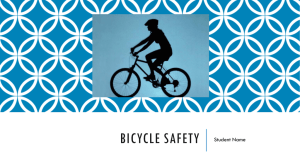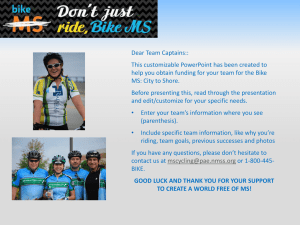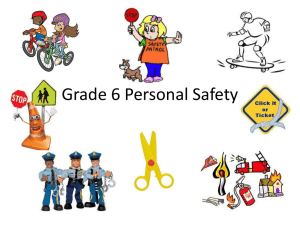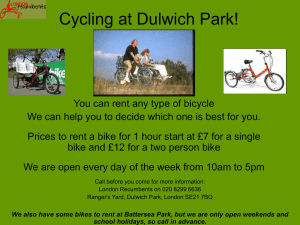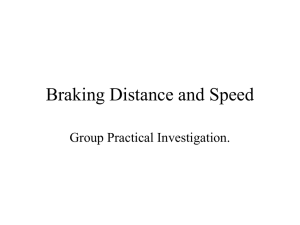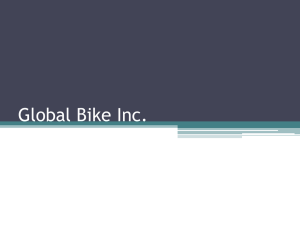Modals
advertisement
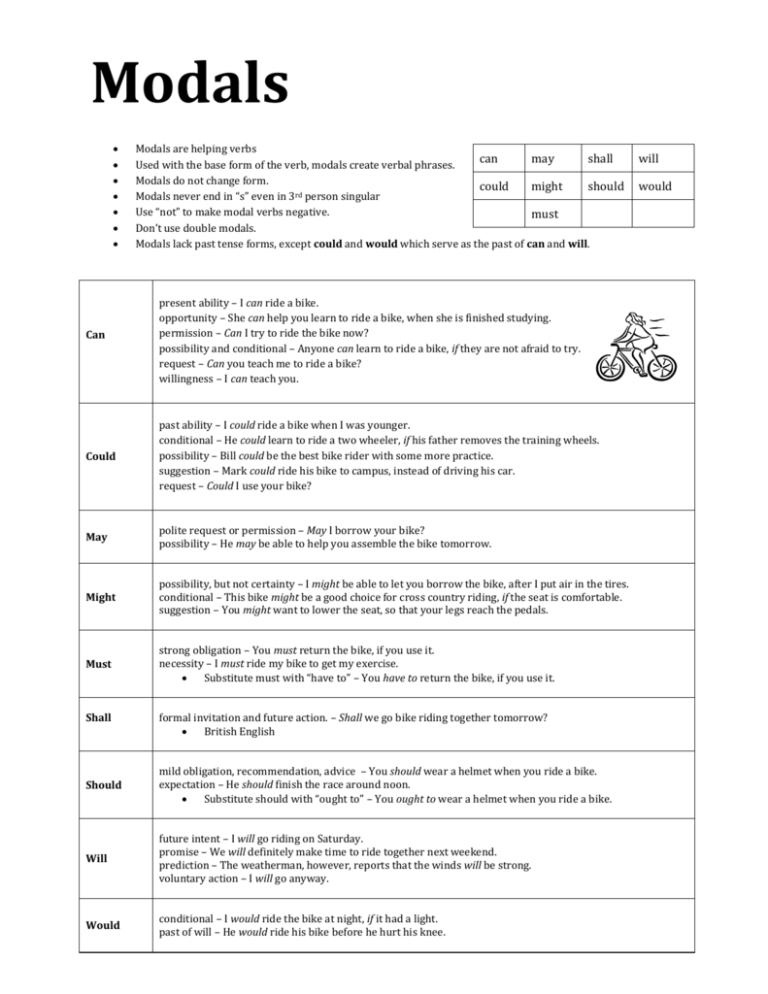
Modals Can Modals are helping verbs can may shall Used with the base form of the verb, modals create verbal phrases. Modals do not change form. could might should Modals never end in “s” even in 3rd person singular Use “not” to make modal verbs negative. must Don’t use double modals. Modals lack past tense forms, except could and would which serve as the past of can and will. present ability – I can ride a bike. opportunity – She can help you learn to ride a bike, when she is finished studying. permission – Can I try to ride the bike now? possibility and conditional – Anyone can learn to ride a bike, if they are not afraid to try. request – Can you teach me to ride a bike? willingness – I can teach you. Could past ability – I could ride a bike when I was younger. conditional – He could learn to ride a two wheeler, if his father removes the training wheels. possibility – Bill could be the best bike rider with some more practice. suggestion – Mark could ride his bike to campus, instead of driving his car. request – Could I use your bike? May polite request or permission – May I borrow your bike? possibility – He may be able to help you assemble the bike tomorrow. Might possibility, but not certainty – I might be able to let you borrow the bike, after I put air in the tires. conditional – This bike might be a good choice for cross country riding, if the seat is comfortable. suggestion – You might want to lower the seat, so that your legs reach the pedals. Must strong obligation – You must return the bike, if you use it. necessity – I must ride my bike to get my exercise. Substitute must with “have to” – You have to return the bike, if you use it. Shall formal invitation and future action. – Shall we go bike riding together tomorrow? British English Should mild obligation, recommendation, advice – You should wear a helmet when you ride a bike. expectation – He should finish the race around noon. Substitute should with “ought to” – You ought to wear a helmet when you ride a bike. Will future intent – I will go riding on Saturday. promise – We will definitely make time to ride together next weekend. prediction – The weatherman, however, reports that the winds will be strong. voluntary action – I will go anyway. Would conditional – I would ride the bike at night, if it had a light. past of will – He would ride his bike before he hurt his knee. will would Use the base form of the word with the modal. Modals do not change form. He could ride for long distances. (correct) He could rode for long distances. (incorrect) Modals never end in “s” even in the third person singular. She should peddle slower. (correct) She shoulds peddles slower. ( incorrect) Combine the base form of the verb with the modals – not with the infinitive “to.” He should ride with traffic. (correct) He should to ride with traffic. (incorrect) Use “not” to make modal verbs negative. I cannot ride a bike. I could not ride a bike because I was afraid of falling. I may not be riding next weekend because I have to work extra hours. She might not wear a helmet, but she is careful when she rides. Bike riders under 17 years of age must not ride without helmets in Pennsylvania. Riders shall not break the traffic rules that apply to cars. When using hand signals to indicate turning, riders should not use their right arm. He will not go riding when it rains. The bike club would not participate in the race because they objected to the high entrance fee. To form questions: Can I teach you how to ride a bike? Should we ask your mother first? Might it help if I let her know that you’ll be wearing a helmet? Will you let me take the training wheels off? Do not use double modals. He could can fix the flat tire. I will might enter the bicycle challenge marathon. Practice: Circle the best modal. He can/ would ride his bike when his car broke down. Bob should not/ may not ride down the middle of the busy road. Might you/ could you repair my broken wheel? My mother always said, “You could/ought to wear a helmet to protect your head.” May/ can I borrow your bike? Can you/ will you go riding in the park with us on Sunday? I have to/ can return the bike to the rental shop by 5 o’clock this evening. Shall/ should we take a tire patch kit with us to make repairs? Tutoring Center BCCC 2/2012
